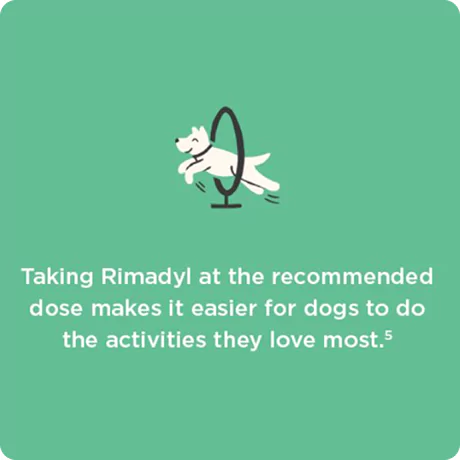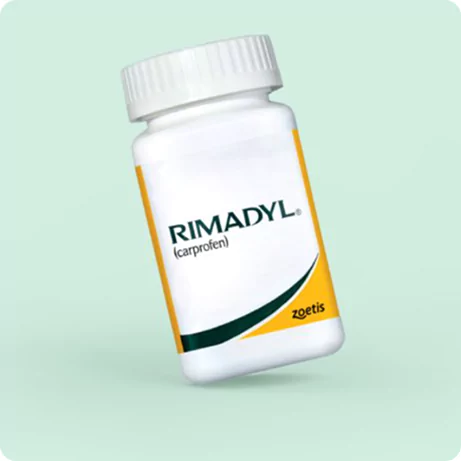What is Rimadyl for Dogs?
Rimadyl for dogs is a non-steroidal anti-inflammatory drug (NSAID) used to treat acute or chronic pain and inflammation in dogs caused by arthritis, hip dysplasia, and other joint diseases. Rimadyl for dogs is also used to reduce postoperative pain associated with orthopedic surgery or dental procedures, as well as to reduce fever. Rimadyl reduces the hormones that cause pain and inflammation in the body, especially in canine osteoarthritis. Rimadyl may also be used for purposes other than those listed here. Rimadyl requires a prescription from your veterinarian.
Suitable For:
Dogs (over six weeks of age)
Benefits:
- Can be given as a single daily dose
- Effective postoperative pain reliever, inflammation and joint issues treatment, and fever reducer
- Easy to administer available as a chewable tablet or caplet
- Well tolerated by dogs
- Improved quality of life due to effective pain control
How does Rimadyl for Dogs work?
Rimadyl for dogs reduces the hormones that cause chronic pain and inflammation in dogs, and also acts as a fever reducer.
Cautions:
IMPORTANT SAFETY INFORMATION: Rimadyl, similar to other human NSAIDs, should be used carefully. As a drug class, nonsteroidal anti-inflammatory drugs (NSAIDS) may be associated with gastrointestinal ulceration, kidney function problems, and liver side effects in dogs. These are usually mild, but may be serious. Pet owners should discontinue therapy and contact their veterinarian immediately if adverse reactions occur. For pets on additional pain medication, it is advisable to have them evaluated for underlying or pre-existing diseases and conditions and regularly monitored. Use with other NSAIDS for dogs or corticosteroids should be avoided.
Brand Name:
Rimadyl (Pfizer Animal Health)
Generic Name:
Carprofen
Frequently Asked Questions
What is the most important thing I should know about Rimadyl for Dogs?
Rimadyl is an FDA-approved prescription medication for dogs. Rimadyl is available in pork liver-flavored chewable, scored tablets in the strengths of 25 mg, 75 mg, and 100 mg. Rimadyl is also available as 25 mg, 75 mg, and 100 mg capsule shaped scored non-chewable tablets (Caplets). The common daily dosage for dogs is 2 mg per pound, which can be given all at once or split into two doses of 1 mg per pound, taken twice a day. Contact your veterinarian if your pet has bloody, black, or tarry stools as these symptoms could indicate damage to the stomach or intestines, which could be dangerous. Before giving your pet any prescription drug or over-the-counter medications, check with your veterinarian or pharmacist.
What should I discuss with my veterinarian before giving Rimadyl to my pet?
Tell your veterinarian if your pet has: an allergy to aspirin or any other NSAIDs for dogs; an ulcer or bleeding in the stomach; liver damage, kidney disease, or renal disease; congestive heart failure; fluid retention; bleeding disorders; heart disease; high blood pressure. Tell your veterinarian if your pet is pregnant or lactating.
How should Rimadyl be given?
Give this medication exactly as directed by your veterinarian. If you do not understand the directions ask the pharmacist or veterinarian to explain them to you. Rimadyl should be given as an oral administration with food. Keep plenty of water available for your pet. Do not give Rimadyl to cats.
What are the common side effects of Rimadyl?
Contact your veterinarian if your pet has bloody, black, or tarry stools, or blood in vomit as these gastrointestinal signs could indicate serious side effects. There have also been reports of events related to suspected renal, hematologic, neurologic, dermatologic, and hepatic effects. If any of the following adverse effects occur, stop giving Rimadyl and seek emergency veterinary medical attention: an allergic reaction (difficulty breathing; swelling of the lips, tongue or face; hives), muscle cramps, open sores in the mouth, rapid weight gain due to fluid retention, seizures, or abdominal cramping. If your pet experiences any of the following less serious side effects, continue giving Rimadyl and talk to your veterinarian: headache, dizziness, nausea, diarrhea or constipation, loss of appetite, depression, fatigue or weakness, or dry mouth. Other side effects may also occur. Talk to your veterinarian about any side effect that seems unusual or bothersome to your pet.
What happens if I miss giving a dose of Rimadyl?
Give the missed prescribed dosage as soon as you remember. However, if it is almost time for the next regularly scheduled dose, skip the missed dose and take the next one as directed. Do not give a double dose of the medication.
What happens if I overdose my pet on Rimadyl?
Seek emergency veterinary care if you suspect there has been a Rimadyl overdose. Adverse reactions that may indicate Rimadyl overdose include nausea, vomiting, stomach upset or pain, drowsiness, headache, blurred vision, seizures, panting, little or no urine production, and slow breathing. If left untreated, a Rimadyl overdose can result in kidney damage, kidney failure, seizures, and even death.
What should I avoid while giving Rimadyl to my pet?
Many over-the-counter cough, cold, allergy, and pain medicines that contain aspirin or other NSAIDs similar to Rimadyl. Consult your veterinary pharmacist before giving any other prescription or over-the-counter medications to your dog to ensure drug compatibility and avoid adverse reactions.
What other drugs will affect Rimadyl?
Tell your veterinarian if your pet is being given aspirin; another NSAID such as etodolac, carprofen, or piroxicam; any over-the-counter cough, cold, allergy, or pain medication; warfarin; furosemide; a steroid such as prednisone; insulin; or probenecid. Drugs other than those listed may also interact with Rimadyl for Dogs. Talk to your veterinarian before giving your pet any prescription or over-the-counter medicines.
Storage:
Store Rimadyl at room temperature, away from moisture and heat. Keep this medication away from children and pets, stored in a medicine cabinet or on a high shelf.




















































